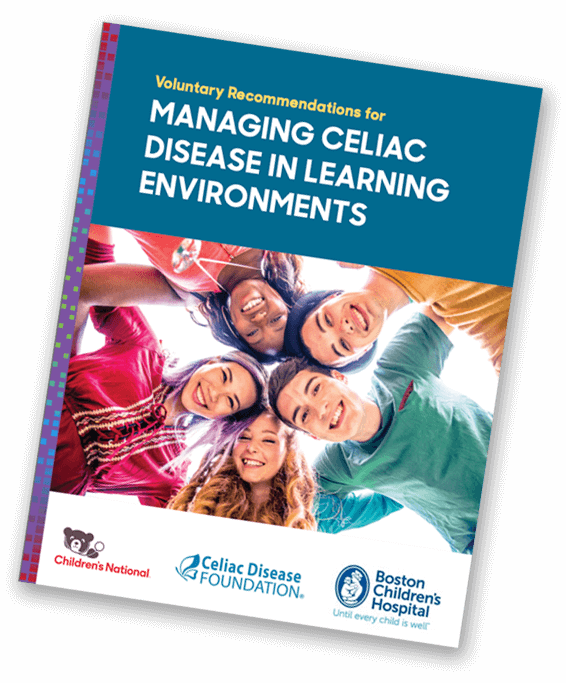Celiac Disease Foundation School Support
Register for Free Webinars
Having a structured 504 Plan in place is crucial for all students with celiac disease, especially those attending public schools or those that receive federal funding. The Celiac Disease Foundation School Support Sessions represent the first ever national celiac disease education partnership with Boston Children’s Hospital, the University of Chicago Celiac Disease Center, Mayo Clinic, Children’s National Hospital, and MassGeneral Hospital for Children. The sessions will be held monthly and be open to all parents of a child with celiac disease in the United States. Each session will be led by an expert on setting up 504 plans specific to celiac disease and will cover federal laws and regulations that govern this autoimmune disease, the appropriate type of plan to set up, reasonable accommodations, and how to get individual support for your family. This meeting is appropriate for families with a child of any age including early childhood through college.
Use this link to register for one of our many sessions:
- Wednesday, November 6, 2024 at 12:30 PST/ 3:30 EST
- Wednesday, December 4, 2024 at 7 am PST/10 am EST
- Wednesday, February 5, 2025 at 12:30 PST/ 3:30 EST
- Wednesday, March 5, 2025 at 12:30 PST/ 3:30 EST
Download School Recommendations
To create one standardized set of recommendations that appropriately apply federal laws, the Celiac Disease Foundation was part of a coalition of 46 experts that convened to develop the 2020 Recommendations for Managing Children with Celiac Disease in Learning Environments. Among these experts were healthcare providers from 10 children’s hospitals (physicians, nurses, dietitians, psychologists, social workers and community education specialists); national education associations; patient and physician advocacy groups; teachers and administrators from public and private schools; parents of children with celiac disease; students with celiac disease; a lawyer with expertise in education law; and a gluten-free food manufacturer.
The recommendations were developed to be applicable in a wide range of learning environments including public schools, private schools, charter schools, day care centers, in-home daycares, and institutions that do and do not receive federal funding. Click this link to view or download the PDF.
Find Helpful Links and Resources
Sample 504 Plan Template for Celiac Disease (PDF)
Sample 504 Plan Template for Celiac Disease (Word Doc)
Diagnosis Letter Template for Physicians (Word Doc)
Celiac School Action Guidelines for Education Training Programs
- For Medical Providers: openpediatrics.org
- For Educators, Food Service Providers, Parents/Guardians, Patients: school.celiac.org
Department of Justice ADA Help Line
Search for Institutions Receiving Federal Funding
- USA Spending is an open data source of federal spending information. This site tracks how federal money is spent in communities across America and beyond.
- usaspending.gov
See Celiac Disease 504 Plan Frequently Asked Questions
How can I help my child attend school safely?
- Read a copy of the 2020 Voluntary Recommendations for Managing Celiac Disease in Learning Environments. This document has all of the relevant information, as well as action lists for parents/guardians and kids with celiac disease.
- Learn about federal laws and regulations that govern celiac disease. If you’re not knowledgeable about these laws, it will be tough to advocate for coverage under them.
- Get your child’s diagnosis letter from the diagnosing physician. You will not be able to begin to get accommodations at school without this letter, so gently nudge your provider to write and sign this document as soon as possible.
- Think about the types of accommodations your child might want at school. Use the list on pages 20-21 of the 2020 Voluntary Recommendations for Managing Celiac Disease in Learning Environments to start building a list of accommodations that you want to ask the school for. It’s helpful to go into meetings with the school with an idea for what your child might need.
- Talk to your child about the accommodation plan. Do they want to eat lunch in the school cafeteria or bring from home? Is there a person they feel comfortable approaching if they are feeling sick or having a problem? What types of materials are they using in class? It’s important that your child is a part of this conversation so that they know what’s available to them and actually use the tools that are put into place.
Our school says they are able to accommodate all things for celiac disease in an Individualized Healthcare Plan (IHP). Is this ok or do I need to push for the 504 Plan?
The Celiac Disease Foundation recommends a 504 plan because it is a legally binding document that is meant to level the playing field for students with disabilities by documenting individual accommodations to support the child in all areas of school life (in the classroom, cafeteria, field trips, etc). Conversely, the IHP is meant to document how the school nurse will provide medical care within the school setting.
If your school continues to push back, we recommend sharing with them the following language from the National Association of School Nurses on why a 504 plan is right for a child with a disability:
“The purpose of developing a 504 plan for a student with a disability is to provide the accommodations necessary for the student to attend, participate in, and be successful at school. A Section 504 plan speaks to the accommodations needed by the student. It is helpful to think of accommodations as actions to “level the playing field” for the student.”
My child has an Individualized Education Plan (IEP) in place for a learning disability. Should we ask for a separate 504 plan for celiac disease?
Accommodations for celiac disease can be included within the existing IEP. Sometimes a school will separate celiac disease into a separate 504 plan. Either way is OK and provides protection and accommodations for your child.
My child has celiac disease and a food allergy that requires an epi pen. Can all of the accommodations be documented within the same 504 Plan?
In this case, we would ask the school to setup a 504 Plan to document the celiac disease accommodations. We would then ask for an addendum to the 504 Plan that includes an individualized healthcare plan (IHP) to explain the management of the allergy with an epi pen. Because the use of an epi pen requires medication to be given in the school setting, this would need to be documented within the context of an IHP.
No one from the school cafeteria was able to attend the 504 meeting and now the nurse is trying to manage daily lunch menus and ordering for our child. How can we fix this so there isn’t a middle person in the mix?
We would recommend calling the food service provider and ask to speak with the manager for your child’s cafeteria or the food service provider’s dietitian. It’s always helpful to speak to the person who is handling your child’s food so that there are no miscommunications. It’s also helpful for your child to meet the cafeteria manager in person so they can have a direct relationship with them. Ask for the cafeteria manager to provide a gluten-free menu in advance (weekly or monthly) so that your child can plan ahead for what they will order and have sufficient time to ask questions.
I need a diagnosis letter for my child to document their celiac disease. Can you provide one?
To get a diagnosis letter, you will need to reach out to your child’s health care provider. The Celiac Disease Foundation is not able to provide documentation of a celiac disease diagnosis.
Can we include an accommodation for excused absences in the 504 plan?
It is important for a school to understand that issues associated with a celiac disease diagnosis may be ongoing and a medical provider may continue to modify the treatment plan. Every child reacts differently to a gluten exposure, some mildly and others very severely. Because of this, a child with celiac disease may need to miss school for periods of time, either for follow-up visits with a member of their multidisciplinary medical team, worsening symptoms, or to initiate a new treatment. If there are ongoing issues related to celiac disease, the parent/guardian should contact the pediatrician or gastroenterologist for evaluation and treatment suggestions. At other times, the child with celiac disease may have milder symptoms, not severe enough to keep him or her out of school.
Can we include an accommodation for extended time on exams or assignments in the 504 plan?
The accommodation needs of a child with celiac disease always require an individualized inquiry that will take into consideration the child’s individual needs and symptoms. While a child with well-controlled celiac disease should not need pre-emptive accommodations for extra time on school assignments, exams, or standardized testing based on celiac disease alone, a child experiencing symptoms may require accommodation. For example, if a child with celiac disease is experiencing symptoms of a gluten exposure or other illness, they may need the opportunity for a make-up session or off-the-clock breaks to allow for bathroom trips necessitated by their disability. Please discuss this with your child’s physician.
Watch Training Program Videos
The Celiac Disease School Action Guidelines for Education (SAGE) Training Program was designed by the Celiac Disease Programs at Children’s National Hospital, Boston Children’s Hospital and the Celiac Disease Foundation with conceptual, technical and editorial help from other institutions including RESOLVE, Cincinnati Children’s Hospital, Colorado Children’s Hospital, Columbia University Celiac Disease Center, Mass General Hospital for Children, Mayo Clinic, Nationwide Children’s Hospital, Seattle Children’s Hospital, and the University of Chicago Celiac Disease Center. Many education associations, public and private schools, and patient families also contributed to the Program.


